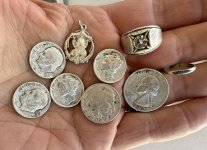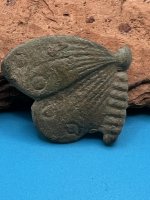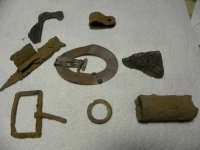lookingharder
Sr. Member
- Feb 27, 2015
- 433
- 753
- Detector(s) used
- Whites Coin Master. Garrett AT Gold, Garrett Ace 350
- Primary Interest:
- All Treasure Hunting
Seems to be a lot of newbies joining our site and since I was curious myself, I thought I would post this. Hope it helps.
What is ground mineralisation?
How does ground mineralisation affect metal detecting?
Mineralised soil is a metal detectors worst enemy. It is responsible for much frustration and confusion for hobbyists the world over.
What is mineralised soil?iron soil ground mineralisation
Ground mineralisation is the amount of magnetism in the soil due to particles in the soil having the “characteristics of metal” and produce a magnetic response picked up by a metal detector.
Old soil exposed to surface conditions for a long period of time are most often highly mineralised.
This is caused by rain water forcing iron compounds to move to the surface.
New soil created y erosion or glacial and river action are low in mineralisation. Most often found in parks and gardens.
Highly mineralised soil is usually highly red in colour.
Australian outback soil often called iron soil is a good example of this and is used to test new metal detector technologies.
Certain of the minerals in the soil affect metal detectors and can cause false signals due to the detectors picking up minerals in soil rather than a real metal target.
Such soil also makes it hard to separate good targets from soil and reduces the depth the detector can reliably reach.
Unfortunately raw gold is often found in such harsh conditions like one would encounter in Zimbabwe. Thus specially designed gold detectors like the GPX 5000 or AT Gold incorporate the latest technology to overcome this ground mineral interference.
Luckily for most hobby detectorists detecting in parks and fields, mineralisation does not generally cause a problem. But tough conditions are found in some areas of South Africa, usually old farms or specific regions.
Ground across the world varies in mineralisation and many detectors are designed to overcome this with some handy features:
Ground balance: many detectors come with manual or automatic ground balance. The detector with the coil placed on the ground or pumped up and down when holding in a specific button allows the detector to pick up the ground mineralisation and calibrate itself to it and ignore it.
Pulse Induction: Certain brands and models of detectors use pulse induction technology which is better able to cope with mineralisation and often ignores it completely as compared to the beat frequency type which can often struggle especially on entry level machines.
Learn more about PI and BFO here. | Learn more about frequency here.
Mineralisation and the Beach:
Minerals and salt that can cause false signals are often found in wet sea sand complicating hunting at the beach. Think about the black sand often seen on the coast, this sand is high in minerals. Some detectors work fine on dry sand and then go crazy in wet sand. Pulse induction fairs much better at the beach.
What is ground mineralisation?
How does ground mineralisation affect metal detecting?
Mineralised soil is a metal detectors worst enemy. It is responsible for much frustration and confusion for hobbyists the world over.
What is mineralised soil?iron soil ground mineralisation
Ground mineralisation is the amount of magnetism in the soil due to particles in the soil having the “characteristics of metal” and produce a magnetic response picked up by a metal detector.
Old soil exposed to surface conditions for a long period of time are most often highly mineralised.
This is caused by rain water forcing iron compounds to move to the surface.
New soil created y erosion or glacial and river action are low in mineralisation. Most often found in parks and gardens.
Highly mineralised soil is usually highly red in colour.
Australian outback soil often called iron soil is a good example of this and is used to test new metal detector technologies.
Certain of the minerals in the soil affect metal detectors and can cause false signals due to the detectors picking up minerals in soil rather than a real metal target.
Such soil also makes it hard to separate good targets from soil and reduces the depth the detector can reliably reach.
Unfortunately raw gold is often found in such harsh conditions like one would encounter in Zimbabwe. Thus specially designed gold detectors like the GPX 5000 or AT Gold incorporate the latest technology to overcome this ground mineral interference.
Luckily for most hobby detectorists detecting in parks and fields, mineralisation does not generally cause a problem. But tough conditions are found in some areas of South Africa, usually old farms or specific regions.
Ground across the world varies in mineralisation and many detectors are designed to overcome this with some handy features:
Ground balance: many detectors come with manual or automatic ground balance. The detector with the coil placed on the ground or pumped up and down when holding in a specific button allows the detector to pick up the ground mineralisation and calibrate itself to it and ignore it.
Pulse Induction: Certain brands and models of detectors use pulse induction technology which is better able to cope with mineralisation and often ignores it completely as compared to the beat frequency type which can often struggle especially on entry level machines.
Learn more about PI and BFO here. | Learn more about frequency here.
Mineralisation and the Beach:
Minerals and salt that can cause false signals are often found in wet sea sand complicating hunting at the beach. Think about the black sand often seen on the coast, this sand is high in minerals. Some detectors work fine on dry sand and then go crazy in wet sand. Pulse induction fairs much better at the beach.
Upvote
0





